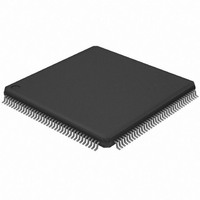AT32UC3A0256-ALUT Atmel, AT32UC3A0256-ALUT Datasheet - Page 133

AT32UC3A0256-ALUT
Manufacturer Part Number
AT32UC3A0256-ALUT
Description
IC MCU AVR32 256KB FLASH 144LQFP
Manufacturer
Atmel
Series
AVR®32 UC3r
Specifications of AT32UC3A0256-ALUT
Core Processor
AVR
Core Size
32-Bit
Speed
66MHz
Connectivity
EBI/EMI, Ethernet, I²C, SPI, SSC, UART/USART, USB OTG
Peripherals
Brown-out Detect/Reset, POR, PWM, WDT
Number Of I /o
109
Program Memory Size
256KB (256K x 8)
Program Memory Type
FLASH
Ram Size
64K x 8
Voltage - Supply (vcc/vdd)
1.65 V ~ 1.95 V
Data Converters
A/D 8x10b
Oscillator Type
Internal
Operating Temperature
-40°C ~ 85°C
Package / Case
144-LQFP
Processor Series
AT32UC3x
Core
AVR32
Data Bus Width
32 bit
Data Ram Size
64 KB
Interface Type
2-Wire, RS-485, SPI, USART
Maximum Clock Frequency
66 MHz
Number Of Programmable I/os
69
Number Of Timers
3
Maximum Operating Temperature
+ 85 C
Mounting Style
SMD/SMT
3rd Party Development Tools
EWAVR32, EWAVR32-BL, KSK-EVK1100-PL
Development Tools By Supplier
ATAVRDRAGON, ATSTK500, ATSTK600, ATAVRISP2, ATAVRONEKIT, ATEXTWIFI, ATEVK1100, ATEVK1105
Minimum Operating Temperature
- 40 C
Controller Family/series
AT32UC3A
No. Of I/o's
109
Ram Memory Size
64KB
Cpu Speed
66MHz
No. Of Timers
1
Rohs Compliant
Yes
Package
144LQFP
Device Core
AVR32
Family Name
AT32
Maximum Speed
66 MHz
Operating Supply Voltage
1.8|3.3 V
For Use With
ATEVK1105 - KIT EVAL FOR AT32UC3A0ATAVRONEKIT - KIT AVR/AVR32 DEBUGGER/PROGRMMR770-1008 - ISP 4PORT ATMEL AVR32 MCU SPIATEVK1100 - KIT DEV/EVAL FOR AVR32 AT32UC3A
Lead Free Status / RoHS Status
Lead free / RoHS Compliant
Eeprom Size
-
Lead Free Status / Rohs Status
Lead free / RoHS Compliant
Available stocks
Company
Part Number
Manufacturer
Quantity
Price
Company:
Part Number:
AT32UC3A0256-ALUT
Manufacturer:
ATMEL
Quantity:
167
- Current page: 133 of 826
- Download datasheet (20Mb)
19.4.1
19.4.2
19.4.3
19.5
19.5.1
32058J–AVR32–04/11
Arbitration
No Default Master
Last Access Master
Fixed Default Master
Arbitration Rules
At the end of the current access, if no other request is pending, the slave is disconnected from
all masters. No Default Master suits low-power mode.
At the end of the current access, if no other request is pending, the slave remains connected to
the last master that performed an access request.
At the end of the current access, if no other request is pending, the slave connects to its fixed
default master. Unlike last access master, the fixed master does not change unless the user
modifies it by a software action (field FIXED_DEFMSTR of the related SCFG).
To change from one kind of default master to another, the Bus Matrix user interface provides the
Slave Configuration Registers, one for each slave, that set a default master for each slave. The
Slave Configuration Register contains two fields: DEFMSTR_TYPE and FIXED_DEFMSTR. The
2-bit DEFMSTR_TYPE field selects the default master type (no default, last access master, fixed
default master), whereas the 4-bit FIXED_DEFMSTR field selects a fixed default master pro-
vided that DEFMSTR_TYPE is set to fixed default master. Please refer to the Bus Matrix user
interface description.
The Bus Matrix provides an arbitration mechanism that reduces latency when conflict cases
occur, i.e. when two or more masters try to access the same slave at the same time. One arbiter
per HSB slave is provided, thus arbitrating each slave differently.
The Bus Matrix provides the user with the possibility of choosing between 2 arbitration types for
each slave:
This choice is made via the field ARBT of the Slave Configuration Registers (SCFG).
Each algorithm may be complemented by selecting a default master configuration for each
slave.
When a re-arbitration must be done, specific conditions apply. See
Rules” on page
Each arbiter has the ability to arbitrate between two or more different master requests. In order
to avoid burst breaking and also to provide the maximum throughput for slave interfaces, arbitra-
tion may only take place during the following cycles:
1. Round-Robin Arbitration (default)
2. Fixed Priority Arbitration
1. Idle Cycles: When a slave is not connected to any master or is connected to a master
2. Single Cycles: When a slave is currently doing a single access.
3. End of Burst Cycles: When the current cycle is the last cycle of a burst transfer. For
which is not currently accessing it.
defined length burst, predicted end of burst matches the size of the transfer but is man-
aged differently for undefined length burst.
133.
See Section “19.5.1.1” on page 134.
Section 19.5.1 ”Arbitration
AT32UC3A
133
Related parts for AT32UC3A0256-ALUT
Image
Part Number
Description
Manufacturer
Datasheet
Request
R

Part Number:
Description:
DEV KIT FOR AVR/AVR32
Manufacturer:
Atmel
Datasheet:

Part Number:
Description:
INTERVAL AND WIPE/WASH WIPER CONTROL IC WITH DELAY
Manufacturer:
ATMEL Corporation
Datasheet:

Part Number:
Description:
Low-Voltage Voice-Switched IC for Hands-Free Operation
Manufacturer:
ATMEL Corporation
Datasheet:

Part Number:
Description:
MONOLITHIC INTEGRATED FEATUREPHONE CIRCUIT
Manufacturer:
ATMEL Corporation
Datasheet:

Part Number:
Description:
AM-FM Receiver IC U4255BM-M
Manufacturer:
ATMEL Corporation
Datasheet:

Part Number:
Description:
Monolithic Integrated Feature Phone Circuit
Manufacturer:
ATMEL Corporation
Datasheet:

Part Number:
Description:
Multistandard Video-IF and Quasi Parallel Sound Processing
Manufacturer:
ATMEL Corporation
Datasheet:

Part Number:
Description:
High-performance EE PLD
Manufacturer:
ATMEL Corporation
Datasheet:

Part Number:
Description:
8-bit Flash Microcontroller
Manufacturer:
ATMEL Corporation
Datasheet:

Part Number:
Description:
2-Wire Serial EEPROM
Manufacturer:
ATMEL Corporation
Datasheet:











